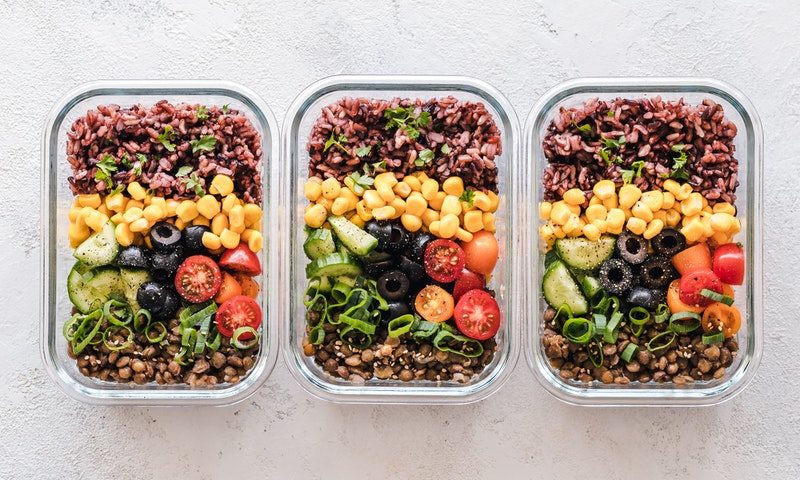by Melissa Majumdar, MS, RD, CSOWM, LDN
The short answer is NO, you are not a failure!
It’s okay to hate meal planning, food prepping and even cooking – and still eat balanced and manage your weight. However, you have to know yourself and your personality, preferences and taste. Everyone needs tools for making healthy lifestyle choices. So, let’s count how many ‘Pros’ and ‘Cons’ you agree with from the list below and see where you fall.
Pros of Meal Planning
- Less Food Waste – Having a plan for your meals – one that includes leftovers – can help you reuse foods and reduce food waste. It can also help you use up ingredients in your kitchen.
- Reduce Food Costs – You can benefit your wallet as well as your waistline by shopping with a planned grocery list. It can help you say no to temptation and avoid eating out when it’s not necessary.
- Balanced Meals – Make sure that your meals and snacks hit your food group goals for the day by incorporating foods from multiple categories into your dishes. Some of these food groups include lean proteins, whole grains, fruits and vegetables and/or dairy.
- No Indecision about What to Eat – For some, having to decide what to eat in the moment can stir up anxiety or give too much freedom to fall into temptation. However, with a game plan for what and when to eat, you might find peace in having structure and comfort.
- Easier Time Sticking to an Earlier Schedule – If dinner is decided and made (or partially prepped) before you get in the door, you can hit the kitchen running and execute dinner in a dash. Also, if lunch is made and waiting in the work mini fridge, it’s easier to fit in between meetings rather than fight the cafeteria crowd or the drive thru line.
- Encourages Variety – When you sit down to create your menu ahead of time, you can peruse Pinterest, blogs and cooking magazines for new recipes. This is great for food inspiration and creativity.
- Save Time in Your Day – Putting in the work and the time at the beginning of your schedule can leave you more room in your day. This comes in handy after a long shift at work when you’re tired and just wanting to rest.
- Portion Control – If meal planning leads to food prep, you can create meals that are satisfying but won’t leave you uncomfortably stuffed.
Cons of Meal Planning
- Time Commitment up Front – Maybe the hours of researching recipes, planning out dinners, shopping, prepping and cooking leaves you overwhelmed. Weekends are for relaxing, not making food.
- Little Flexibility in Meal/Snack Choices – You might find yourself not wanting the food you planned. In this case, you may feel like planned meals are wasted and a waste of your time.
- Anxiety about Sticking to Structure – If Sunday is meal prep day but it’s full of birthday parties, errands, etc., and you don’t get to the actual act of meal prepping, your week may feel ruined. If you are uncomfortable falling away from a plan, this can cause anxiety.
- Creation of Food Rules – Having a food plan and pre-portioned meals can be helpful, but not if it creates rigidity and doesn’t allow you to connect with what your body needs. If Tuesday is always taco day but you don’t want tacos, your meal planning isn’t working.
- Leftovers Can Get Boring and Less Satisfying – After eating chili three days in a row, you might not want to eat it again for six months.
- Doesn’t Promote Intuiting Eating – Some days we need more food, others we need less food. Some days we want fish, others chicken. Intuitive eating allows you to be mindful about what your body and mind need, while meal planning may take this part out of the equation.
- Potential Food-borne Illness – After 3-5 days in the fridge, some food starts to spoil. This isn’t cost-effective.
Do You Have More Pros or Cons?
Decide if it’s…
- (1) Time to suck it up and get on the #MealPrepMonday train or
- (2) Give yourself forgiveness and stop beating yourself up for not having all your meals made for the week.
If you decided to give up on the planning, find a middle ground that feels comfortable. Maybe you still create a thorough, balanced grocery list and keep the pantry, freezer and fridge stocked with the necessities.
Think about what your schedule allows for each week. Do you need some prep time during especially busy weeks? Maybe you can cut the veggies or marinate the protein the night before or morning of. Have go-to seasonings on hand and a collection of tried and true recipes if you need a quick weeknight meal.
You can also enlist family and friends to help with some of the meal planning so it doesn’t all fall on you. That way, everyone is happy at meal time.
Batch cooking, leftovers and cooking gadgets like crock pots and pressure cookers can all be great time-savers, even if not used on a weekly basis.
Conclusion
At the end of the day, meal planning doesn’t need to define you. However, for some, it can be a great tool for weight and health management. If it’s not for you, it’s okay to step away from measuring your success by an Instagram-worthy, Tetris-style fridge of prepped meals.
CLICK HERE for more information and tips on meal planning.
About the Author:
Melissa Majumdar, MS, RD, CSOWM, LDN, is a registered dietitian who has been specializing in weight management and bariatric surgery for the last 12 years. She is the bariatric coordinator for Emory University Hospital Midtown and is a mother of two. She starts her Thanksgiving with a turkey trot and saves space for butternut squash mac and cheese.






